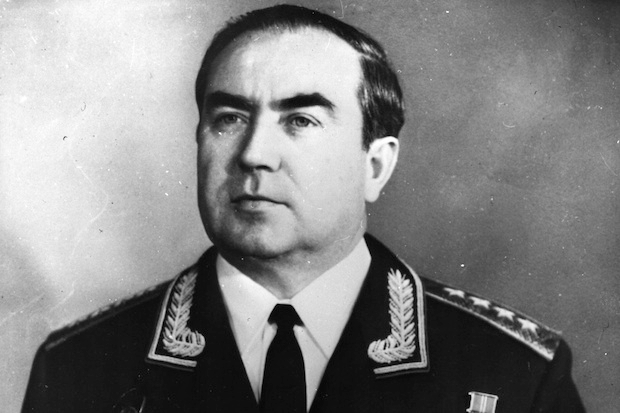Alas, the ’63 ports are beginning to fade. I came to that conclusion the last time I tasted a Warre’s, and the other night I was at the drinking of a Graham’s, an exemplar of that magnificent year. It was still delicious, and from the summit of a mountain there is a long descent. But the journey had begun. The passing of a great vintage deserves a grand obsequy: tolling bells, slow marches, a gun-carriage. How appropriate, therefore, that our host was not only a Grenadier but perhaps the most famous member of that illustrious regiment in recent decades.
There are so many stories about Valentine Cecil, and most of them are true. One year, stationed in Berlin, he decided to celebrate his birthday in the Hotel Stadt in East Berlin, whose dining room was normally reserved for East German ministers and Russian generals. Early that evening, the atmosphere was even more oppressive than usual. The sole diner was a three-star Russian, who looked as if he were on guard at the table as he addressed his food in sullen and solitary pomp.
Suddenly, the gloom was dispelled: the doors rocked on their hinges. Twenty young men from the Household Division charged in and overran an enormous table. Already illuminated, they drank vast quantities of Champagne. Toast followed toast. Although the Russki was accoutred as well as a Soviet tailor could manage, his khaki was no match for their blue and scarlet and gold. Worse still for his temper, they took no notice of his presence.
Like many previous Russian commanders, however, he had one advantage: endurance over time. He could sozzle and glower indefinitely. But under the four-power rules governing Berlin, the Brits had to be back through Checkpoint Charlie by midnight. Valentine summoned the bill in good time. In several volumes, it was proffered to him, but he waved it away: ‘No, no: give that to my soldier servant.’ Out of a sack, Guardsman Vince proceeded to fish a fair few wads of black-market Ostmarks.
This was too much for the Russian. He stumped over and addressed the gathering: ‘Gentlemen, what I have seen tonight convinces me of the decadence of the British officer class.’ His mood was not improved when they applauded him back to his place. The British campaign still had to manage an orderly withdrawal and, at first, there seemed to be a problem. The approach march to the frontier was interrupted by a Vopo (East German policeman) who stood in the middle of the road and said, ‘Alt.’
We did not recognise East Germany, or its police force. In that case, argued some of the more logical diners, the Vopo did not exist and they should just drive on. Valentine refused. Having no intention of ending his birthday with an international incident, he wound down the window: ‘Yes, Officer?’ ‘I just wanted to say “Happy Birthday, Lord Valentine”,’ came the reply as the Vopo waved them through.
Sometime earlier, a friend of Valentine’s had a lunch party. The guest of honour was David Fraser the Razor, who should have been Chief of the General Staff but was blocked by Michael Carver, the most overrated Field Marshal since Montgomery, his own patron. That host asked the great man if it would be OK to invite Valentine, then a very young subaltern, and received an enthusiastic affirmative, justified by events. At the end of lunch, General David enquired about the best place to find a taxi: he had not brought his driver. ‘Don’t worry, General,’ said Valentine: ‘I’ve got my driver.’ Not long afterwards, he became David Fraser’s ADC.
Because soldiers spent much of their career in danger or performing to an exactitude well beyond civilian comprehension, they use humour to unwind. That is why military anecdotes are so life-enhancing, especially when accompanied by a great port, even if it was six months past its best.






Comments